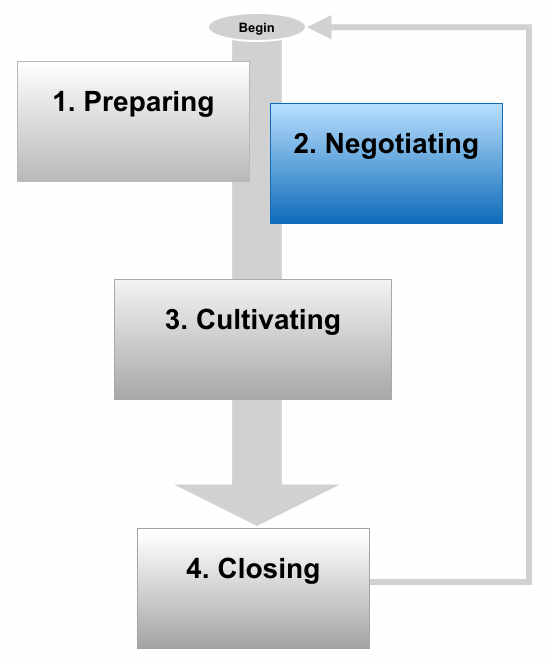Phase 2: Negotiating


In the negotiating phase, mentors and mentees discuss how the mentoring relationship will function. This is also the time to define specific goals to be achieved and ways that the mentoring relationship will support those goals. The process of aligning expectations might take some negotiation. When done respectfully, these discussions can create a strong foundation for open communication and trust as the relationship progresses.14,15
Problems between mentors and mentees can arise from misunderstandings about expectations.14,16 It is well worth the time at the start of the relationship to talk candidly about your expectations for one another. These critical conversations can help prevent a mentor-mentee mismatch and create a mutual sense of clarity about roles and responsibilities. Revisiting these expectations periodically can help keep everyone on track regarding their original commitments to one another.
Click the categories below to see examples of expectations that might be important to align as you begin working with your research mentees:
Communicating
Frequency of meetings, content to be discussed at meetings, and methods for initiating meetings; when and how to engage the full mentor team if multiple mentors are involved; expectations of truthfulness, openness, confidentiality, and respect; mechanism for the mentee to provide constructive feedback to the mentor; understanding and appreciation of individual differences.
Support to be Provided by the Mentor
Work space, funding, materials, access to a technician; supervision of research; introduction to colleagues in the mentor’s professional network; timely critique of written research products; assistance with maintaining the mentee’s time balance across professional responsibilities; help with professional skill development (responsible conduct of research, team leadership, critical thinking, teaching, public speaking); facilitated access to training or career growth opportunities.
Responsibilities of the Mentee
Develop goals for training and career; self-reflect on and discuss professional strengths and weaknesses with the mentor; be open to constructive criticism and advice; follow through on recommendations and tasks; share results of those efforts with the mentor; make progress toward goal achievement; take initiative in developing the mentoring relationship (plan meeting agendas, ask productive questions, listen actively, be responsive and flexible).
Transition to Independence
How will the mentor and mentee acknowledge one another’s contribution to shared projects? What are both individuals’ understandings about ownership and future use of data (e.g., to support a grant proposal) generated from a mentored research project? How will they ultimately differentiate the mentee’s research from that of the mentor? When will the relationship come to a close?
Expert Advice
- Mentees may not always know what they can realistically expect from their research mentors. Ask reflective questions or use a written tool, such as a mentorship compact, to elicit your mentees’ expectations and delineate yours (see examples in Resources). Be honest about what you can offer a mentee and what performance standards you expect.
- Consider asking your mentees to create an individual development plan (IDPs). IDPs prompt mentees to reflect on their goals and what they need to achieve them. Most IDPs include some type of self-assessment to elucidate a mentee’s strengths, weaknesses, and potential challenges to meeting their goals. With this information in hand, you can work together to develop a personalized mentorship plan.
- Make it a habit to revisit expectations, goals, and timelines with your mentees. It’s unlikely these will remain static, especially during a more prolonged mentoring period such as graduate school. Trainees may need to adapt their goals in response to changes in the employment market or new research interests. Faculty members may need to adjust their timelines in response to changes in assigned duties, work environment, or personal life.

